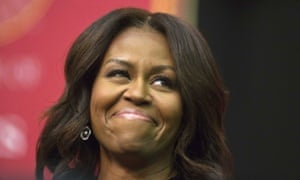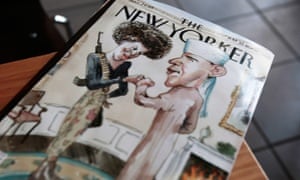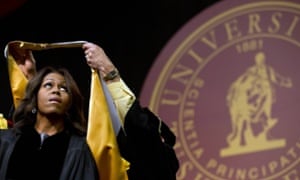Michelle Obama: I was 'knocked back' by race perceptions
US first lady speaks out on her experiences as an African American amid racial tensions between black communities and police
Michelle Obama says she had to fight misperceptions due to her ethnicity during the 2008 White House campaign that led to her husband becoming the first black president of the US.
She told an audience of mainly black graduates she feared racial stereotypes might be harming her husband’s election campaign and worried what her daughters might feel if they knew what people were saying about her.
And she warned them of the “daily slights” they would face throughout their lives in the US, where “those age-old problems are stubborn and they haven’t fully gone away”.
Obama, who grew up in humble circumstances in Chicago and became a successful corporate lawyer, has rarely discussed race during her husband’s two terms in office.

But recent cases of alleged abuse of African Americans by police officers, and related unrest in Baltimore, made it hard to avoid.
“As potentially the first African-American first lady, I was also the focus of another set of questions and speculations, conversations sometimes rooted in the fears and misperceptions of others,” Obama said in a frank address at Tuskegee University in Alabama on Saturday.
“Was I too loud or too angry or too emasculating? Or was I too soft, too much of a mom, not enough of a career woman?” she asked, at the historically black university.
For the first magazine cover featuring Obama in 2008, The New Yorker parodied her as a radical and a terrorist. “It was a cartoon drawing of me with a huge afro and a machine gun,” she recalled. “Now, yeah, it was satire, but if I’m really being honest, it knocked me back a bit. It made me wonder just how are people seeing me.”

In an address lasting almost half-an-hour, she recalled racially insensitive comments, including when Fox News television said she was her “husband’s crony of colour” and “Obama’s baby mama” – the latter US slang for an unwed mother. Elsewhere, she recalled, the media had accused her of “a little bit of uppity-ism”, as well as describing a celebratory fist bump with her husband as a “terrorist fist-jab”.
“Back in those days, I had a lot of sleepless nights worrying about what people thought of me, wondering if I might be hurting my husband’s chances of winning his election, fearing how my girls would feel if they found out what some people were saying about their mom,” Obama recalled.
“I had to ignore all of the noise and be true to myself – and the rest would work itself out,” she said, drawing cheers from graduates.
Aside from mastering details of administration policy, she said, “I also worked to ensure that my efforts would resonate with kids and families – and that meant doing things in a creative and unconventional way.
“So, yeah, I planted a garden, and hula-hooped on the White House lawn with kids. I did some mom-dancing on TV ... And at the end of the day, by staying true to the me I’ve always known, I found that this journey has been incredibly freeing.”
But Obama returned to issues of racism in America with a warning to Tuskegee’s graduates that “the road ahead is not going to be easy”. “It never is,” she said, “especially for folks like you and me. Because while we’ve come so far, the truth is that those age-old problems are stubborn and they haven’t fully gone away. So there will be times ... when you feel like folks look right past you, or they see just a fraction of who you really are.”

People would not see them as the hard-working graduates they appeared on the day of their graduation who had struggled to achieve their education, pay for it, and give back to their communities, she said. “They don’t know that part of you.
Frustration, Obama said, “can feel isolating. It can make you feel like your life somehow doesn’t matter. And as we’ve seen over the past few years, those feelings are real.”Instead they will make assumptions about who they think you are based on their limited notion of the world.”
“They’re rooted in decades of structural challenges that have made too many folks feel frustrated and invisible, and those feelings are playing out in communities like Baltimore and Ferguson and so many others across this country.”
The first lady’s comments have drawn praise, but a prominent figure in the civil rights campaign that followed the police shooting of a teenager in Ferguson, Missouri, last year said that Obama did not face the same experiences as less privileged black Americans.
Kareem Jackson, of Hands Up United, said: “In America, the black experience my mother endures is drastically different to the black experience of Michelle Obama. We are currently living in a country that allows certain black people to hide behind the guise of privilege, class, and education.”
Jackson, a community activist from Ferguson who performs as a rapper under the stage name Tef Poe, said that while he respected Obama for facing down racism and sexism, “the truth still remains she is the first lady of the United States of America”.
No comments:
Post a Comment